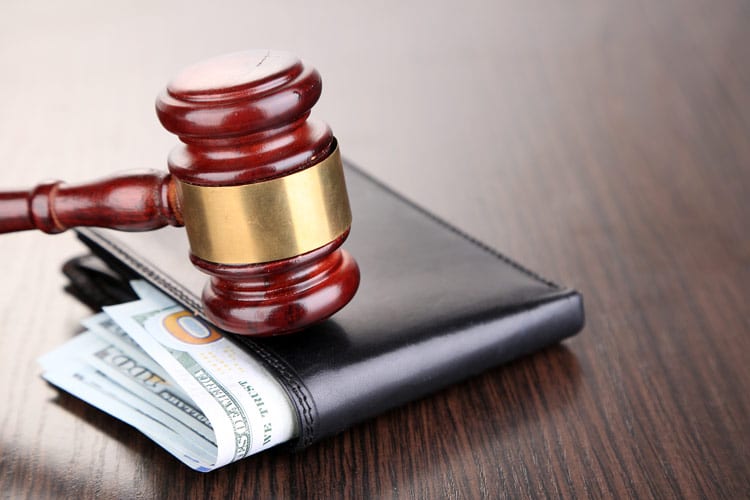Can My Creditors Garnish My Wages?
Home » Credit Card Debt »
Six months after James lost his job at an auto parts distributorship, his financial life began melting down. His tendency to spend freely on restaurants and vacations relied on the frequent and heavy use of a credit card, and the monthly minimum payment on his $9,000 balance was more than he could afford.
Several months later, the calls started, first from credit card companies, then collection agencies. Even though he found a new job, he earned less and couldn’t make the payments.
All the while, the 26 percent interest tacked on to his unpaid balance compounded what he owed.
Sued By My Credit Card Company
Eventually, the expected happened. His credit card company sued, taking James – who couldn’t afford a lawyer – to state court where it won a judgment. A judge allowed the creditor to seize 25 percent of James’ weekly earnings through a process called garnishment.
Not long ago, garnishment orders were used primarily to collect unpaid child support, but an increasing number now are awarded to credit card issuers or bad-debt collectors.
Wage Garnishment Affects 1 in 10 Workers
A 2014 investigation from National Public Radio and the ProPublica journalism organization found that one in 10 working Americans between that ages of 35 and 44 had wages garnished. More than 6 percent of employees earning between $25,000 and $40,000, or about one in 16, had wages taken to repay consumer debt, the study found.
Amount Garnished Depends On Your State
States vary on how much of a debtor’s pay can be garnished. Four states – North Carolina, Pennsylvania, South Carolina and Texas – prohibit garnishment for most debts, while other states and territories set limits of as much as 25 percent of wages. Since 1970, federal law has protected about 75 percent of an employee’s paycheck no matter where the person lives.
So what should you know about garnishment? First, carefully read the legalese in your credit card agreement. It will explain what the card company, bank or debt collector can do if you default. Then, become acquainted with your state’s garnishment law.
Credit cards are unsecured debts. If you borrow money against your house and fail to repay, the house serves as collateral. If you don’t pay a car loan, the vehicle can be seized. But a credit card has no such backing, and a court-ordered wage garnishment is practically the only way a lender can recoup a bad debt.
Impact of Interest On Your Ability To Pay Back Credit Card Debt
Charging exceptionally high interest on unpaid debt is one of the ways card issuers offset their risk. It makes their business profitable even though some debts are never recovered. But those high rates make repaying debts even harder as the amount owed can grow quickly if not paid off each month.
Obviously, the best policy is to pay in full each month. But when life throws a curve ball – a medical emergency, for example – borrowing might be the only way to cover the expense. If you fall behind and conclude you can’t catch up on your own, contact a non-profit debt counselor to discuss a debt management plan. That might include consolidating balances and creating a payment plan that the counselor manages.
The goal is to avoid a collection lawsuit. Once you are sued, expect the creditors to have lawyers who know their stuff and probably have a ready-made case using the card agreement you signed. Losing in court can mean paying attorney’s fees to the debt holder as well as a burden of losing as much as a quarter of your wages.
After Garnishment, Your Debt Can Still Grow
Worse still, your debt can continue to grow if the garnishment doesn’t cover the interest payments. Even your garnishment order chips away at the principal due, it might take years to get out of debt and the amount you pay will be far more than what you originally borrowed.
If you served with a debt-collection lawsuit, do the following:
- Settle the debt if you can. Your creditor may prefer forgiving a portion of your debt and saving on legal fees. If you don’t have cash to put up for a settlement, consider selling an asset.
- Review your state’s laws. Laws set limits on how large garnishments can be, and they allow for exemptions. Become familiar with the exemptions and, if you end up defending yourself against a suit, file for any exemptions that might apply to you.
- File for bankruptcy protection. Bankruptcy can inflict enormous damage to your future ability to borrow, but sometimes it’s the only way out of debts that can’t be repaid. Before filing bankruptcy, review your situation with a credit counselor and an attorney.
Sources:
- Arnold, C. and Kiel, P. (2014, September 14) Million of Americans’ Wages Seized Over Credit Card and Medical Debt. Retrieved from: http://www.npr.org/2014/09/15/347957729/when-consumer-debts-go-unpaid-paychecks-can-take-a-big-hit
- Michon, K. (ND) Can Credit Card Companies Garnish My Wages? Retrieved from: http://www.nolo.com/legal-encyclopedia/can-credit-card-companies-garnish-wages.html

